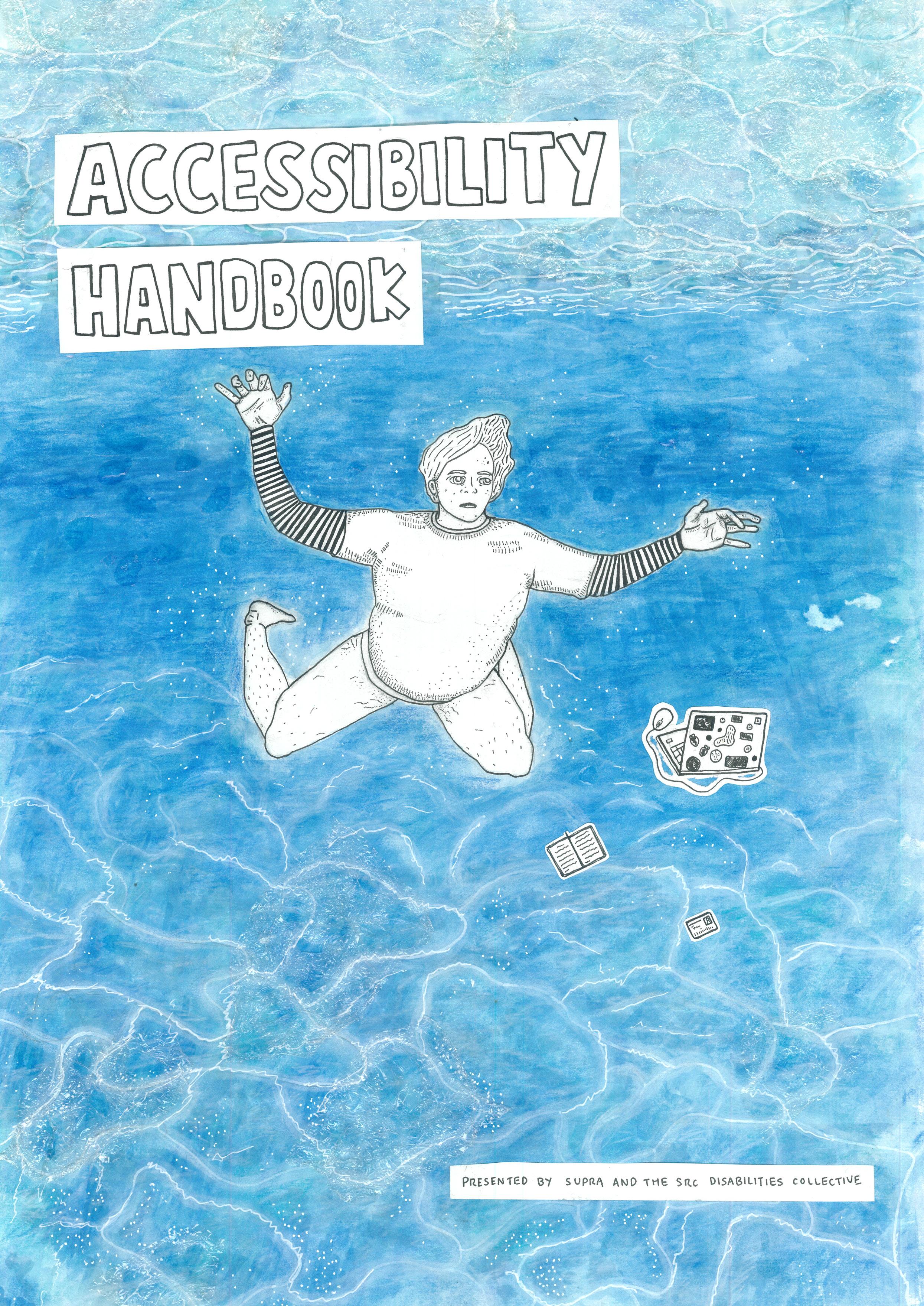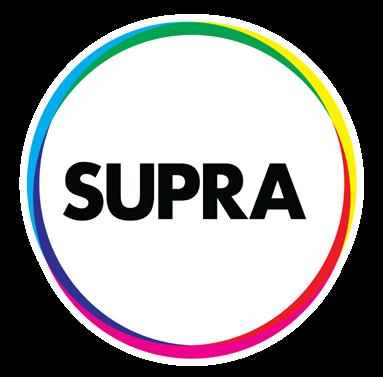


Editors
Gemma Lucy Smart
Khanh Tran
Jack Scanlan
Contributors
Grace Wallman
Sarah Korte
Design
Khanh Tran
Covers
Hannah Rose
Table of Content
3 Getting involved
4 Who we are
6 Social Model of Disability
8 Navigating Support
10 External Support
Acknowledgement of Country
The SRC Disabilities Collective and SUPRA Disability and Inclusion Network recognise that our activism, advocacy and work happens on stolen, unceded Gadigal Land of the people of the Eora Nations who have, for countless generations, been the custodians of this Land. Indigenous peoples have had to endure significant injustices, despite being one of the oldest living cultures in the world. We are particularly indebted to disabled First Nations activists who fought and continues to fight against .
In our activism and work, we will uplift the perspective, voice and experiences of First Nations peoples in order to dismantle the colonial and ableist systems of oppression that plague every aspect of this colonial state for these systems of oppressions are intertwined.
Always was, Always will be Aboriginal Land.
This publication is brought to you by the Sydney University Postgraduate Students’ Association (SUPRA) and the University of Sydney Students’ Representative Council (SRC).
2 |
Getting involved
Unlike other student societies, SUPRA’s Disabilities & Inclusion Network and DisCo (the Disabilities Collective) are actively political. We wage campaigns and organise action within a space in which everyone can grow both politically and personally. We encourage that you join one of our organisations so that we can campaign and collectively raise the voice of disabled students.
SRC Disabilities Collective
Facebook: bit.ly/DisabilitiesCollective Twitter: @USYDdis Disabilities.officers@src.usyd.edu.au
The Disabilities Collective (or affectionately known as DisCo) is an autonomous collective for disabled undergraduate students, defined by the United Nations Convention on the Rights of Persons with Disabilities (CRPD) as ‘long-term physical, mental, intellectual or sensory impairments which in interaction with various barriers may hinder their full and effective participation in society on an equal basis with others’. This includes people who may not personally identify as disabled, or prefer other designators, for instance, people who are deaf or hard of hearing, mad, neurodivergent, mentally ill, otherwise ill and so on.
SUPRA Disabilities & Inclusion Network
Facebook: bit.ly/SUPRADisabilitiesInclusion Disability@supra.usyd.edu.au
The SUPRA Disability and Inclusion Network is a meeting point for postgraduate students at the University of Sydney who identify with having a disability. Coursework postgraduate students and HDRs are both welcome.
Caregivers, those working in relevant research fields, and allies are also welcome in the online network, although they are not given voting permission in the election of our Equity Officer according to the SUPRA Constitution. We welcome them as part of our community nonetheless.
As part of our network’s activities we run both social and activist events, as well as keep you informed about disability-related matters on campus.
You can also contact our Disability Equity Officers confidentially via: disability@supra.usyd.edu.au.
| 3
Join via the QR Code below Join via the QR Code below
Who we are
SRC Disabilities Collective
We are a group of student activists, meaning that we plan our work around holding institutions such as Sydney University accountable. We work at all levels of politics

to enact policies that further the welfare and interests of disabled students, including with other student unions.
Disability and Carers Officers: Khanh Tran & Jack Scanlan
We are Khanh Tran and Jack Scanlan, your SRC Disabilities Officers! This year will be a pivotal year for all disabled people in Australia, not least because the final report of the years-long Disability Royal Commission will be released. However, the work and activism needed to bring students
and people with disabilities to the fore cannot stop nor focus solely on a single Royal Commission. At Sydney University alone, implementation of a social model of disability remains distant, from inaccessible quarters and a nontactile campus.
Contact email: disabilities.officers@usyd.src.edu.au
SUPRA Disabilities & Inclusion Network
SUPRA is the postgraduate student association at the University, run by postgrads for postgrads. SUPRA represents all postgraduates at the University of Sydney, and all
postgraduates can look to SUPRA for assistance with any issues that may confront them, academically and personally, during the course of their candidature.
Disability Equity Officers: Eva & Gemma Lucy (she/they)
I’m Gemma – your SUPRA Disability Equity Officer and your HDR representative on the Disability Inclusion Action Plan Implementation Committee. I’m a PhD researcher and here to do what we can to improve the lives of students with disabilities/disabled students at


the University. I run the SUPRA Disability and Inclusion Network as a way of connecting with other students and providing them a space for community and advocacy. I’m passionate about disability inclusion, accessibility, awareness, and activism.
Contact email: disability@supra.usyd.edu.au
4 |
University of Sydney Union
The University of Sydney Union or the USU in short, is the oldest student organisation in Australia and one of the largest! We presides over much of student life and culture at the University.

Organising everything from soldout gigs at Manning Bar, presiding over hundreds of Clubs and Societies (C&S), the USU is one of the institutions that defines Sydney University traditionally as
Disability Portfolio Holder: Grace Wallman (she/her)
Hi! I’m Grace, and I’m the USU’s Disability Portfolio Holder. The USU is a student-run organisation that provides services, programs and amenities to improve both Undergraduate and Postgraduate students’ experiences at the University. The USU Disability Portfolio is focused on ensuring USU programs, events and venues are fully accessible to disabled

Other campus office-holders
students. There are many opportunities for students to get involved – we’re especially keen to hear feedback from disabledidentifying students about their experiences with the USU. At the moment we are also in the process of devweloping our first USU Disability Inclusion Action Plan (DIAP) – a big step in ensuring the USU advocates for and includes disabled students!
Other than the SRC and SUPRA, a handful of other disabilities student representatives can be contacted at the following clubs and societies, including the University of Sydney Union (USU):
Sydney Arts Students’ Society (SASS): Annalise Schwarzorva (Disabilities Officer)
disability@usydarts.com
Sydney University Law Society (SULS): Lucas Kao (Disabilities Officer)
disabilities@suls.org.au
University of Sydney Sign Language Society (USyd SignSoc): Ferran Thornycroft (President)
| 5
What is Disability?
People with disabilities are defined as those “who have long-term physical, mental, intellectal or sensory impiarments which in interaction with various barriers may hinder their full and effective participation in osciety on an equal basis with others”. as per the United Nations Conventions on the Rights of Persons with Disabilities . A disability is any condition of the body or mind (impairment) that makes it more difficult for the person with the condition to do certain activities (activity limitation) and interact with the world around them (participation restrictions).
Disability can be permanent or temporary, visible or invisible. And in the context of higher education it’s important to appreciate that having a disability does not mean one is less suited to be a university student, it just means that one might need accommodations and support to achieve academically. Discrimination on the basis of disability is prohibited by the federal Disability Discrimination Act 1992 . There are eight broad types of disabilities that the Act provides for:
Physical disability : Impacts mobility or dexterity
Intellectual disability: Impacts ability to learn or process information
Mental illness: Impacts thinking processes
Sensory disability: Impacts the ability to hear or see
Neurological disability: Impacts the brain and central nervous system
Learning disability: Impacts acquisition, organisation, retention, and understanding of information
Physical disfigurement: Impacts physical appearance
Immunological disability: Impact due to the presence of organisms causing disease in the body
Data obtained from the University of Sydney Annual Report 2022, Australian Institute of Health and Welfare’s People with Disability Australia (2022).

6 |
Disability can be permanent or temporary, visible or invisible.
The Social Model of Disability
To those unfamiliar with the way that student disabilities organisations understand disability, the social model of disability provides a good starting point.

The United Nations’ Convention On The Rights Of Persons With Disabilities (CRPD) explains that “disability results from the interactions between persons with impairments and attitudinal and environmental barriers that hinders their full and effective participation in society on an equal basis with others”.
The social model of disability stands in contrast to other models of disability such as the medical model which views disability as a medical problem that needs to be ‘cured’, the charity model that views disabled people as helpless objects deserving of pity or the eugenics model of disability that views.
The social model of disability shifts the focus away from the disabled individual as the ‘problem’ that needs to be ‘solved’, and towards the barriers that society puts in front of disabled people. Some examples of this for disabled university students and staff include a lack of accessible access to buildings, lack of captioning and audio description during lecturers and tutorials and a lack of flexible work or study arrangements. It can also include other barriers such as social perceptions and ostracisation, with people often perceiving those who are neurodivergent or with mental health conditions as ‘strange’ or ‘anti-social’, or the prevalent perception that providing accommodations are inconvenient or unnecessary and disabled people should simply ‘try harder’.
People With Disability Australia’s (PWDA) explains that the social model does not mean that disabled people do not face impairments, its primary function is to provide the lens through which we understand disability and by extension, the experience of disabled people.
In Professor Mark Pimm’s (Birkbeck University) words, disabilities are the result of “the choices society makes”. This includes government policies that hinder and impede on people with disability such as cuts by stealth to the NDIS (National Disability Insurance Scheme) and dysfunctional healthcare systems.
In a 2017 lecture, provocatively titled ‘Disability History, Bleeding Hearts and Parasite People’, Mike Oliver, one of the pioneering disabled scholars behind the origination of the social model, delivered a stern rebuke to what he viewed as corporatism in disability advocacy:
“The big disability charities with their plush London offices, highly paid executives and glossy publications have proved predictably useless at defending the living standards and lifestyles of disabled peoplwe from these vicious attacks while continuing to do very well for themselves,” Oliver said.
“These charities need us to be dependent and tragic otherwise there is no justification for their existence.”
In many ways, Oliver’s scathing observations ring true in Australia as much as it does in Britain, with the increasing corporatisation of activism and the hollowing out of progressivism under the whims of business.
We recommend that all those interested in the social model of disability read, carefully, Oliver’s observations. It is a clarion call for critical examination of our politics and consideration of the collective. The social model, properly understood, demands that we assess the harm to the collective of our society rather than atomising our own existence. To quote Oliver’s words: “We all have personal troubles, but we must see that they are public issues that we must confront by attacking the disabling barriers we face if we are to make our own way in this wicked world. What disability history teaches us is that we cannot rely on the bleeding hearts brigade and parasite people to do it for us.”
| 7
Adapted from Khanh Tran and Sarah Korte, Disabled Honi 2022
Navigating Support
SRC and SUPRA Casework
Both the Students’ Representative Council (SRC) and Sydney University Postgraduate Students’ Association (SUPRA) operate free caseworker and legal services to assist with your degree and issues that may overlap with disability needs and accommodations.

Caseworkers assists students on academic and welfare issues. They provide free and confidential advice on a range of matters such as: academic rights and appeals; special considerations and special arrangements; HECs and fee refunds; academic misconduct and dishonesty allegations; show cause and expulsion; Centrelink; financial issues; tenancy and accommodation; harassment and discrimination.
University of Sydney SRC Casework Service: bit.ly/SRCcaseworker
02 9660 5222
Wentworth Building, Level 1/G01 City Rd, Darlington, NSW 2006
Contact the SRC Caseworkers through the Caseworker Contact Form here: http://bit.ly/3JVav4D
SUPRA Postgraduate Advocacy Service: bit.ly/SUPRACaseworker
02 9351 3715
Level 2, Holme Building (A09), Science Rd Camperdown Campus
Contact the SUPRA Postgraduate Advocacy Service through the Caseworker Contact Form here: supra.net.au/contact/
Attach any documents about your enquiry when you email. Depending on the time of the year, it may take between one (1) to five (5) business days for a Caseworker to respond to your email.
8 |
Inclusion and Disability Services
sydney.edu.au/students/health-wellbeing/inclusion-and-disability.
html
+61 2 8627 8422
Level 5, Jane Foss Russell Building (next to City Road, on the Camperdown/ Darlington Campus).
Disability.services@sydney.edu.au
Sydney University runs an Inclusion and Disability Services (IDS) office in accordance with its obligation to students with disabilities under the Disability Discrimination Act 1992 and the University’s own Disability Inclusion Action Plan (DIAP).

We strongly recommend that, where possible, register with the Inclusion and Disability Services at the earliest available opportunity as the Service will provide you with support, access to academic adjustments, and an Academic Plan to mitigate the barriers that you face in your university studies.
Disability Services provides a number of services. Most importantly, they work with you to develop an individualised academic plan and arrange academic adjustments for your studies, including extra time, specialist equipment, colour-coded materials, and more as determined by your Disability Officer.
Follow the following steps to register with Disability Services:
1 2 3
Obtain the necessary supporting documentation prior to applying. You will need to provide a supporting documentation form. This form is accessible via this link:
https://www.sydney.edu.au/content/dam/students/documents/ support-resources/disability-support/support-documentationdisability-services.pdf
The form must be completed in English and officially translated medical documents are also accepted.
In some cases, specific supporting documentation is required instead of the general form. These include specific learning disabilities, handwriting difficulties and where you wish to study abroad as a few examples.
Complete an online application to register form with Inclusion and Disability. You need to be a current student with a Unikey in order to register.
Inclusion and Disability Services will then book a registration consultation with you. This meeting lasts for approximately one (1) hour.
| 9
External Support
Australian Centre for Disability Law
The Australian Centre for Disability Law provides a free toolkit for students with disability in all levels of university, TAFE, vocational education, certificate courses and other types of training:
disabilitylaw.org.au/projects/education/#furtheredu
If you are within New South Wales and want advice outside of University services, you can get free legal advice on disability discrimination by calling the Australian Centre for Disability Law on (02) 9370 3135 or 1800 800 708 between 9.30am and 12.30pm on Mondays and Wednesdays, and between 1.30pm and 4.30pm on Thursdays. You can also contact their referral service via their website:

disabilitylaw.org.au/resources/referrals/
National Disability Insurance Scheme
The National Disability Insurance Scheme, otherwise referred to as the NDIS, is a federal and state government program that provides support for people with disabilities who ‘have a permanent and significant disability’ that affects one’s ‘ability to take part in everyday activities’. Its scope is wide and funding is provided directly to individuals. There are a variety of funded supports offered through the NDIS such as:
• Daily personal activities
• Transport to enable participation in community, social and economic activities
• Workplace support to enable an NDIS participant to successfully gain or maintain employment
• Home modifications
• Vehicle modifications.
This list of NDIS-funded supports is not exhaustive and further information on the range of NDIS supports are available here through NDIS plans and budgets:
ndis.gov.au/participants/creating-your-plan/plan-budget-and-rules
Find out more about the NDIS’ Access Request Form in order to register to the program here:
ndis.gov.au/applying-access-ndis/how-apply
10 |
University Health Service
sydney.edu.au/students/health-wellbeing/health-services.html
+61 (0) 2 9351 3484 (Wentworth)
2 Butlin Avenue, Darlington, NSW 2008
The University of Sydney operates a dedicated General Practitioners’ (GP) service and surgery on campus located on Level 3 of the Wentworth Building.

The surgery is open Monday to Friday, 8.30am to 5pm during term time. The service offers bulk billing and is familar with major health insurance providers for international students.
You can book an appointment at the University Medical Centre through one of three ways: online, telephone or fax.
Online: Book an appointment online via the link below. You can choose either a telehealth or in-person appointment.
sydney.edu.au/students/health-wellbeing/health-services.html
Counselling
sydney.edu.au/students/health-wellbeing/counselling.html
+61 2 8627 8433
Level 5, Jane Foss Russell Building (G02), 160 City Road, Darlington NSW 2008
Sydney University offers individual counselling sessions for students to discuss confidentially with a counsellor on issues that affect your mental wellbeing and academic performance. These are short-term therapy sessions where counsellors provide recommendations on treatments and resources according to your needs.
There is a limit of up to six (6) sessions per student. Telehealth is also available via phone or Zoom.
Where you require long-term support, the service will help you to find an external provider, and where necessary, interlinked with University support services such as Inclusion and Disability Services, University Health Services and many more.
Contact Student Wellbeing through the Qualtrics form below where a University clinician will contact you and discuss your needs:
sydney.au1.qualtrics.com/jfe/form/SV_bvGBwTkeptE5nwy
| 11
Nothing about us without us.

















